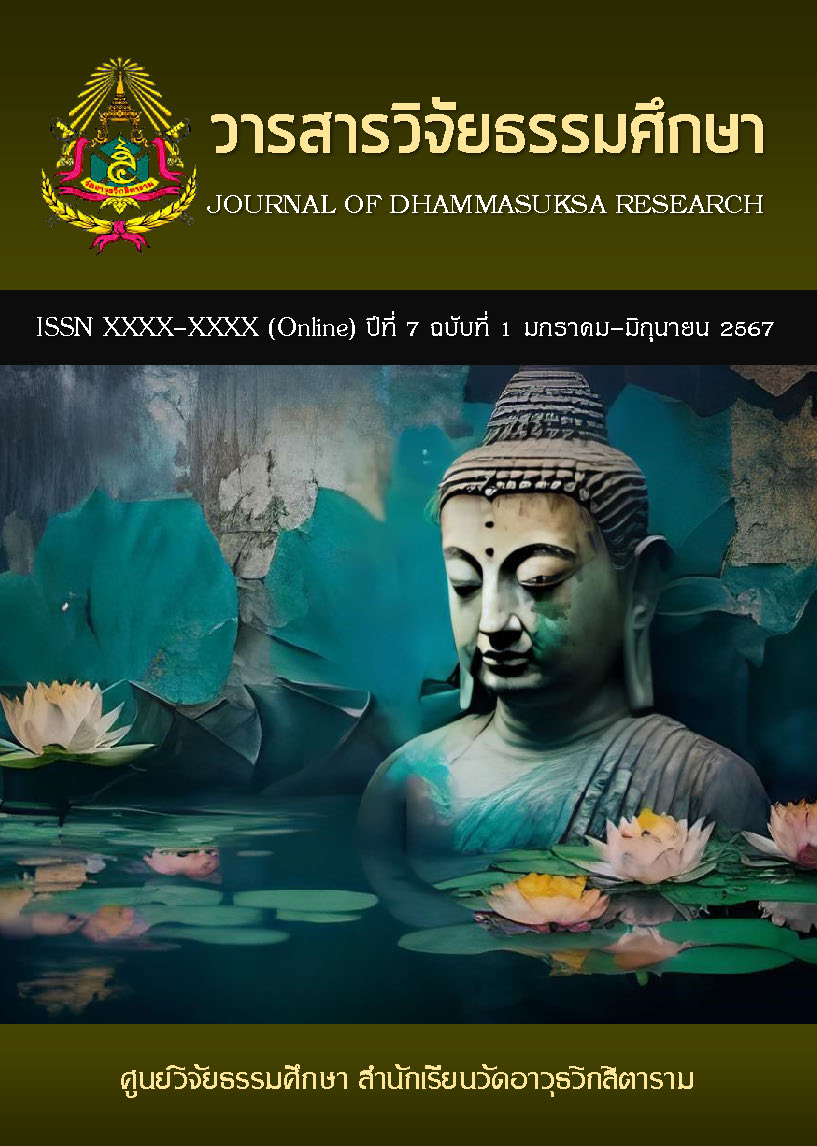การพัฒนาคุณภาพชีวิตของประชาชนด้วยปรัชญาหลักการทรงงานของพระบาทสมเด็จพระปรมินทรมหาภูมิพลอดุลยเดช
คำสำคัญ:
ปรัชญาของเศรษฐกิจพอเพียง, คุณภาพชีวิตการทำงาน, ประยุกต์ตามภูมิสังคมบทคัดย่อ
งานวิจัยนี้เป็นงานวิจัยเชิงคุณภาพแบบวิเคราะห์เอกสาร ตั้งคำถามการวิจัยไว้ว่า “การพัฒนาคุณภาพชีวิตของประชาชนด้วยปรัชญาหลักการทรงงานของพระบาทสมเด็จพระปรมินทรมหาภูมิพล อดุลยเดชควรเป็นอย่างไร” โดยมีวัตถุประสงค์ของการวิจัย ดังนี้ 1) เพื่อศึกษาหลักการทรงงานในพระบาทสมเด็จพระปรมินทรมหาภูมิพลอดุลยเดช 2) เพื่อศึกษาปรัชญาหลังนวยุค และ 3) เพื่อวิเคราะห์การพัฒนาคุณภาพชีวิตประชาชนด้วยปรัชญาหลักการทรงงานของพระบาทสมเด็จพระปรมินทรมหาภูมิพลอดุลยเดช
ผลการวิจัย พบว่า 1. หลักการทรงงานในพระบาทสมเด็จพระปรมินทรมหาภูมิพลอดุลยเดช รัชกาลที่ 9 มีอยู่ทั้งหมด 23 ข้อ ดังนี้ 1) ศึกษาข้อมูลอย่างเป็นระบบ 2) ระเบิดจากข้างใน 3) แก้ปัญหาที่จุดเล็ก 4) ทำตามลำดับขั้น 5) ภูมิสังคม 6) องค์รวม 7) ไม่ติดตำรา 8) ประหยัด เรียบง่าย ได้ประโยชน์สูงสุด 9) ทำให้ง่าย 10) การมีส่วนร่วม 11) ประโยชน์ส่วนรวม 12) บริการรวมที่จุดเดียว 13) ใช้ธรรมชาติช่วยธรรมชาติ 14) ใช้อธรรมปราบอธรรม 15) ปลูกป่าในใจคน 16) ขาดทุนคือกำไร 17) การพึ่งตนเอง 18) พออยู่พอกิน 19) เศรษฐกิจพอเพียง 20) ความซื่อสัตย์ สุจริต จริงใจต่อกัน 21) ทำงานอย่างมีความสุข 22) ความเพียร 23) รู้ รัก สามัคคี 2. ปรัชญาหลังนวยุค เป็นปรัชญาเพื่อการพัฒนาคุณภาพชีวิตเพื่อการสร้างสรรค์ ปรับตัว ร่วมมือ และแสวงหา 3. การพัฒนาคุณภาพชีวิตประชาชนด้วยปรัชญาหลักการทรงงานของพระบาทสมเด็จพระปรมินทรมหาภูมิพลอดุลยเดช มีปรัชญาของเศรษฐกิจพอเพียงเป็นรากฐานทางปรัชญา และนำเอาหลักการทรงงาน 23 ข้อมาเป็นส่วนขับเคลื่อน โดยมีรากฐานความคิดที่ทำเพื่อประชาชนส่วนรวมเป็นสำคัญงประจักษ์พยานในเชิงรูปธรรมนั้นก็คือ โครงการในพระราชดำริตั้งแต่ปี พ.ศ. 2495 ถึง 2559 มีจำนวนทั้งสิ้น 4,685 โครงการ
เอกสารอ้างอิง
กีรติ บุญเจือ. (2558). “ลักษณะหลังนวยุคในทฤษฎีความพอเพียงของพระบาทสมเด็จพระเจ้าอยู่หัวภูมิพลอดุลยเดชฯ”. รายงานวิจัย. กรุงเทพฯ: มหาวิทยาลัยราชภัฏสวนสุนันทา.
ชัยโรจน์ นพเฉลิมโรจน์. (2558). “หลักคุณภาพในโครงการอันเนื่องมาจากพระราชดำริกับปรัชญาหลังนวยุค: การศึกษาเชิงวิเคราะห์ วิจักษ์ และวิธาน”. วิทยานิพนธ์ปรัชญาดุษฎีบัณฑิต. สาขาปรัชญาและจริยศาสตร์. บัณฑิตวิทยาลัย: มหาวิทยาลัยราชภัฏสวนสุนันทา.
ธรรมนูญ วิถี, พลตรี. (2559). “แนวทางการแก้ไขปัญหาความเหลื่อมล้ำของสังคมไทยตามปรัชญาเศรษฐกิจพอเพียง”. รายงานวิจัย. กรุงเทพฯ: วิทยาลัยป้องกันราชอาณาจักร.
ปราโมทย์ หม่อมศิลา. (2561). คุณภาพชีวิตของทหารไทยตามหลักปรัชญาหลังนวยุคสายกลาง: การศึกษาเชิงวิเคราะห์ วิจักษ์ และวิธาน. วารสารบัณฑิตศึกษา มหาวิทยาลัยราชภัฎสวนสุนันทา, 8(2): 259-66.
รวิช ตาแก้ว (บ.ก.). (2559). ประเทศไทยกับธรรมาภิบาลด้วยปรัชญาเศรษฐกิจพอเพียง. กรุงเทพฯ: มหาวิทยาลัยราชภัฎสวนสุนันทา.
สิริกร อมฤตวาริน และกีรติ บุญเจือ. (2558). “ปรัชญาเศรษฐกิจพอเพียงกับความสุขแท้ตามความเป็นจริง”. วารสารบัณฑิตศึกษา มหาวิทยาลัยราชภัฎสวนสุนันทา, 8(2): 259-66.
สุดารัตน์ น้อยแรม และกีรติ บุญเจือ. (2561). “พระปฐมบรมราชโองการของพระบาทสมเด็จพระปรมินทรมหาภูมพิลอดุลยเดชกับประโยชน์นิยม : การศึกษาเชิงวิเคราะห์”. มนุษยสังคมสาร (มมส), 16(3): 21-34.
ดาวน์โหลด
เผยแพร่แล้ว
รูปแบบการอ้างอิง
ฉบับ
ประเภทบทความ
หมวดหมู่
สัญญาอนุญาต
ลิขสิทธิ์ (c) 2024 วารสารวิจัยธรรมศึกษา

อนุญาตภายใต้เงื่อนไข Creative Commons Attribution-NonCommercial-NoDerivatives 4.0 International License.



